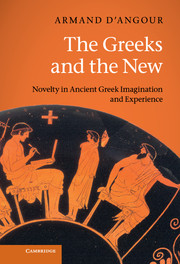Book contents
- Frontmatter
- Contents
- Acknowledgements
- Introduction
- Chapter 1 New, new, new
- Chapter 2 Loosening the grip of the past
- Chapter 3 The transformations of Kaineus
- Chapter 4 Old and new
- Chapter 5 Nothing new under the sun
- Chapter 6 The birth of Athena
- Chapter 7 Inventions of Eris
- Chapter 8 The newest song
- Chapter 9 Constructions of novelty
- Chapter 10 So what's new?
- References
- General index
- Index of Greek terms
- Index locorum
Chapter 10 - So what's new?
Published online by Cambridge University Press: 07 September 2011
- Frontmatter
- Contents
- Acknowledgements
- Introduction
- Chapter 1 New, new, new
- Chapter 2 Loosening the grip of the past
- Chapter 3 The transformations of Kaineus
- Chapter 4 Old and new
- Chapter 5 Nothing new under the sun
- Chapter 6 The birth of Athena
- Chapter 7 Inventions of Eris
- Chapter 8 The newest song
- Chapter 9 Constructions of novelty
- Chapter 10 So what's new?
- References
- General index
- Index of Greek terms
- Index locorum
Summary
In short, nothing is being said now that has not been said before.
Terence, Eunuchus 23–4Given the profuse and disparate manifestations of the Greeks’ imaginative interactions with the new, there can be no simple historical narrative of their engagement with novelty. What is discernible, however, is that over the classical period the sensibility of change as a cyclical and repetitive process, an assumption no less evident in Greece than in other traditional societies, yielded intermittently to a more innovationist outlook. The rapid growth of knowledge and the development of new tekhnai were advanced by the use of writing and as a result of the intensified interchange of people, goods and ideas; and the diversification of knowledge created an ever broader acknowledgement of the role and possibilities of doing and experiencing new things. The consciousness of growing human capacity, posited by Meier (1990) as an ancient equivalent of progress, together with an increased recognition of the benefits of novelty and change, led to a more explicit embrace of the new. In the terms suggested by Csapo and Miller (1998), the kinds of novelty allowed by ‘aristocratic’ perspectives on temporality were augmented by (and in some areas overtaken by) new kinds of novelty afforded by ‘democratic’ understandings of temporality. Negative sentiments in the face of change, such as the expressions of helplessness (amēkhaniā) found in early lyric poetry, recede in fifth-century writings. In their place, a positive confidence in human beings’ ability to control their environment is expressed by medical authors, sophists and historians, and given forceful poetic expression by the ‘ode to man’ in Sophokles’ Antigone.
These writings reflect a recognition that the new need not be something that simply happens; it can be brought about through human intention, effort and ingenuity. While human beings cannot control the workings of fate, it could be felt (to paraphrase Agathon) that contingency and skill go hand in hand. Linguistic considerations reflect this shift of attitude to novelty. By the late sixth century, the semantic range of neos has been extended from the predominantly temporal towards the more qualitative connotations associated with kainotēs and the manufacture of novelty. Neos means not just ‘young’ or ‘recent’, but ‘new’, as found in the Pythagorean statement that ‘nothing is wholly new (neon)’. In this period, the word kainos makes its appearance for the first time in Greek texts. The import and creation during the orientalising period (eighth to sixth centuries) of beautiful, bright and highly finished ‘new’ objects of manufacture from the Near East may have contributed to the sense that something can be ‘brand-new’. The derivation I have proposed for kainos (Chapter 3) raises a nexus of associations to manufactured artificiality, externality, brightness and technological elaboration. These notions do not displace the common associations of neos to youth, recency and natural, organic change, but they augment and complement them.
- Type
- Chapter
- Information
- The Greeks and the NewNovelty in Ancient Greek Imagination and Experience, pp. 225 - 232Publisher: Cambridge University PressPrint publication year: 2011



